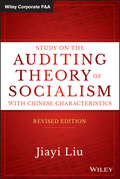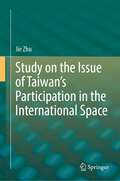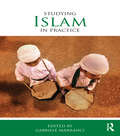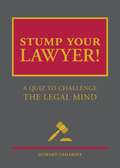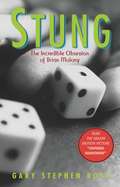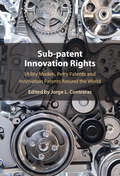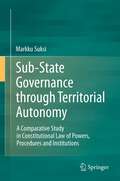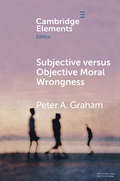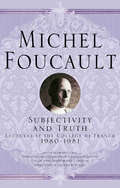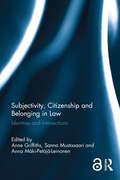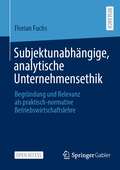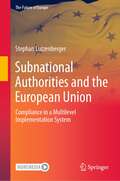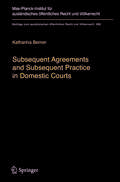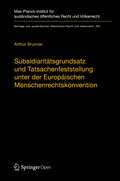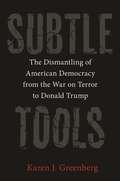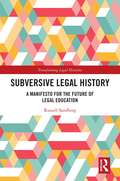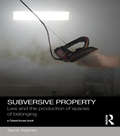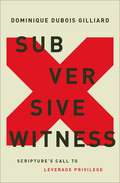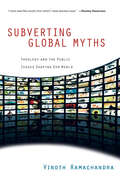- Table View
- List View
Study on the Auditing Theory of Socialism with Chinese Characteristics, Revised Edition
by Jiayi LiuA comprehensive guide to China's public, private, and internal audit system Study on the Auditing Theory of Socialism with Chinese Characteristics provides a comprehensive overview of China's auditing practices. Recent years have seen the National Audit Office of China (CNAO) making remarkable headway not only in China by guaranteeing the healthy operation of the economy and society and improving national governance through government auditing, but also in the international arena by carrying out audits with the United Nations. With constant development in the practice, an audit theory with socialist Chinese characteristics has taken shape, centering on the premise that government auditing serves as the cornerstone and safeguard of national governance. At the XXI INCOSAI held in 2013 in Beijing, the theme of "national audit and national governance" proposed and chaired by CNAO, was met with widespread approval by participants from over 160 countries, and led to the endorsement of the Beijing Declaration, which makes it a priority and target for audit institutions to promote good national governance. To explore the nature and development of government auditing, this book probes into the history and reality, and theories and practices of auditing in various countries, and puts forward the assertion that, "as a cornerstone and important safeguard for national governance, government auditing is an 'immune system' endogenous within the synthetical system of national governance, with functions of precaution, revelation and defense." Furthermore, China's socialist auditing theory has been elaborated in nine aspects, nature, functions, goals, features, methods, management, framework of regulations and standards, IT application and culture, covering the new concepts, methodologies, techniques and achievements of China's government auditing. This book is highly relevant, practical, and readable. Jiayi Liu, the chief author, is the Auditor General of China and the current Chairman of INTOSAI Governing Board. In 2013 he won the United Nations Peace Prize in recognition of his auditing work for UN peacekeeping operations.
Study on the Issue of Taiwan’s Participation in the International Space
by Jie ZhuThis book points out the legal roots of the alignment of Cross-Strait political relations and the issues of Taiwan's participation in international space, and the Treaty of San Francisco and the “Undetermined Status of Taiwan”. Based on an academic standpoint, the book studies the legal theories related to the alignment of Cross-Strait political relations and the issues of Taiwan's participation in international space from the Mainland Chinese perspective. It focuses on the different descriptions and regulations of the alignment of Cross-Strait political relations between the Mainland of China and Taiwan and discusses the status, forms, problems, and prospects of the coexistence of the two sides in the international space. Compared with the policy oaths used in current studies, the book systematically discusses the alignment of Cross-Strait political relations and the issues of Taiwan's participation in international space with a theoretical interpretation. It uses detailed historical materials, especially valuable policy documents and excerpts of speeches cited of the Mainland of China. This book puts forward a series of important propositions, such as the construction of a mechanism for Taiwan’s orderly participation in the international space and means of existence of the Taiwan region in the international space.
Studying Islam in Practice (Studying Religions in Practice)
by Gabriele MarranciThis book presents Islam as a lived religion through observation and discussion of how Muslims from a variety of countries, traditions and views practice their religion. It conveys the experiences of researchers from different disciplinary backgrounds and demonstrates the dynamic and heterogeneous world of Islam. The fascinating case studies range from Turkey, Egypt, Morocco and Lebanon to the UK, USA, Australia and Indonesia, and cover topics such as music, art, education, law, gender and sexuality. Together they will help students understand how research into religious practice is carried out, and what issues and challenges arise.
Studying for your Policing Degree (Critical Study Skills)
by Martin Wright Jane Bottomley Steven PryjmachukStudying for your Policing Degree is PERFECT for anyone wanting to train to become a police officer. After reading this fully comprehensive guide you will understand: the structure and culture of HE, and how policing fits into it what to expect, and what will be expected of you, as a university student teaching and assessment methods within policing, so that you can perform to the best of your ability in an academic environment how to manage your policing studies in an effective way and make the most of the resources available to you. The books in our Critical Study Skills series will help you gain the knowledge, skills and strategies you need to achieve your goals. They provide support in all areas important for university study, including institutional and disciplinary policy and practice, self-management, and research and communication. Packed with tasks and activities to help you improve your learning, including learner autonomy and critical thinking, and to guide you towards reflective practice in your study and work life. Uniquely, this book is written by a subject specialist and an English for Academic Purposes (EAP) expert.
Stump Your Lawyer
by Howard ZaharoffFor the lawyers who think they know it all&mdas;lor for those of you who worry that your legal counsel can't tell a tort from a tartStump Your Lawyer! is a hilarious tour of the quirks and curiosities of our legal system. This tongue-in-cheek volume offers witty, practical, and thought-provoking challenges for the legally minded. Short case histories, definitions, multiple-choice quizzes, and other formats mock the bar exam approach and probe the reader's knowledge of obscure statutes, baffling decisions, bizarre legal concepts, and antiquated jargon. Whether you're studying, practicing, or running from the law, this book will keep you laughing--and learning--all the way to the courthouse.
Stung: The Incredible Obsession of Brian Molony
by Gary Stephen RossHe was one of the brightest stars at the Canadian Imperial Bank of Commerce, a brilliant young banker on his way to the top. But Brian Molony had a secret obsession: he loved to gamble. The unsuspecting bank was soon fueling that obsession, as Molony helped himself to hundreds of thousands, then millions, of dollars in fraudulent loans. Despite falling deeper and deeper in the hole, Molony convinced himself he could win it all back. Before long, the mild-mannered assistant manager had become one of the biggest high-rollers the casinos had ever seen and earned himself a place in the annals of criminal history.
Sub-Patent Innovation Rights: Utility Models, Petty Patents and Innovation Patents Around the World
by Jorge L. ContrerasThis ground-breaking work delves into the world of sub-patent intellectual property rights, exploring utility model and similar protection offered by over 100 countries worldwide. Drawing on the expertise of leading scholars from around the globe, this volume provides a comprehensive analysis of sub-patent protection systems, comparing and contrasting statutory frameworks, registration requirements, corporate strategies and litigation tactics. The book also highlights current policy debates surrounding these systems, including their potential to promote local innovation and economic development, proposals for cross-border harmonization, and their interaction with increasingly integrated litigation systems. This book is an invaluable resource for scholars, attorneys, historians, economists, and anyone dealing with complex international intellectual property matters. This title is also available as Open Access on Cambridge Core.
Sub-State Governance through Territorial Autonomy
by Markku SuksiThis study focuses on territorial autonomy, which is often used in different conflict-resolution and minority situations. Four typical elements are identified on the basis of the historical example of the Memel Territory and the so-called Memel case of the PCIJ; distribution of powers, participation through elections and referendums, executive power of territorial autonomy, and international relations. These elements are used for a comparative analysis of the constitutional law that regulates the position of six currently existing special jurisdictions, the Åland Islands in Finalnd, Scotland in the United Kingdom, Puerto Rico in the United States of America, Hong Kong in China, Aceh in Indonesia and Zanzibar in Tanzania. The current sub-state entities examined can be arranged in relation to Memel in a manner that indicates that Hong Kong and the Åland conform to the typical territorial autonomy, while Puerto Rico and Aceh should probably not be understood as territorial autonomies proper. At the same time, the territorial autonomies can be distinguished from federally organized sub-state entities.
Subjective versus Objective Moral Wrongness (Elements in Ethics)
by Peter A. GrahamThere is presently a debate between Subjectivists and Objectivists about moral wrongness. Subjectivism is the view that the moral status of our actions, whether they are morally wrong or not, is grounded in our subjective circumstances – either our beliefs about, or our evidence concerning, the world around us. Objectivism, on the other hand, is the view that the moral status of our actions is grounded in our objective circumstances – all those facts other than those which comprise our subjective circumstances. A third view, Ecumenism, has it that the moral status of our actions is grounded both in our subjective and our objective circumstances. After outlining and evaluating the various arguments both against Subjectivism and against Objectivism, this Element offers a tentative defense of Objectivism about moral wrongness.
Subjectivity and Truth: Lectures at the Collège de France, 1980-1981
by Michel Foucault“The working hypothesis is this: it is true that sexuality as experience is obviously not independent of codes and systems of prohibitions, but it needs to be recalled straightaway that these codes are astonishingly stable, continuous, and slow to change. It needs to be recalled also that the way in which they are observed or transgressed also seems to be very stable and very repetitive. On the other hand, the point of historical mobility, what no doubt change most often, what are most fragile, are modalities of experience.” - Michel Foucault In 1981 Foucault delivered a course of lectures which marked a decisive reorientation in his thought and of the project of a History of Sexuality outlined in 1976. It was in these lectures that arts of living became the focal point around which he developed a new way of thinking about subjectivity. It was also the moment when Foucault problematized a conception of ethics understood as the patient elaboration of a relationship of self to self. It was the study of the sexual experience of the Ancients that made these new conceptual developments possible. Within this framework, Foucault examined medical writings, tracts on marriage, the philosophy of love, or the prognostic value of erotic dreams, for evidence of a structuration of the subject in his relationship to pleasures (aphrodisia) which is prior to the modern construction of a science of sexuality as well as to the Christian fearful obsession with the flesh. What was actually at stake was establishing that the imposition of a scrupulous and interminable hermeneutics of desire was the invention of Christianity. But to do this it was necessary to establish the irreducible specificity of ancient techniques of self. In these lectures, which clearly foreshadow The Use of Pleasures and The Care of Self, Foucault examines the Greek subordination of gender differences to the primacy of an opposition between active and passive, as well as the development by Imperial stoicism of a model of the conjugal bond which advocates unwavering fidelity and shared feelings and which leads to the disqualification of homosexuality.
Subjectivity, Citizenship and Belonging in Law: Identities and Intersections
by Anne Griffiths Sanna Mustasaari Anna Mäki-Petajä-LeinonenThis collection of articles critically examines legal subjectivity and ideas of citizenship inherent in legal thought. The chapters offer a novel perspective on current debates in this area by exploring the connections between public and political issues as they intersect with more intimate sets of relations and private identities. Covering issues as diverse as autonomy, vulnerability and care, family and work, immigration control, the institution of speech, and the electorate and the right to vote, they provide a broader canvas upon which to comprehend more complex notions of citizenship, personhood, identity and belonging in law, in their various ramifications.
Subjectivity, Citizenship and Belonging in Law: Identities and Intersections
by Anne Griffiths Sanna Mustasaari Anna Mäki-Petäjä-LeinonenThis collection of articles critically examines legal subjectivity and ideas of citizenship inherent in legal thought. The chapters offer a novel perspective on current debates in this area by exploring the connections between public and political issues as they intersect with more intimate sets of relations and private identities. Covering issues as diverse as autonomy, vulnerability and care, family and work, immigration control, the institution of speech, and the electorate and the right to vote, they provide a broader canvas upon which to comprehend more complex notions of citizenship, personhood, identity and belonging in law, in their various ramifications.Chapter 7 of this book is freely available as a downloadable Open Access PDF at http://www.taylorfrancis.com under a Creative Commons Attribution-Non Commercial-No Derivatives (CC-BY-NC-ND) 4.0 license.
Subjektunabhängige, analytische Unternehmensethik: Begründung und Relevanz als praktisch-normative Betriebswirtschaftslehre
by Florian FuchsIn diesem Open-Access-Buch beleuchtet Florian Fuchs den historischen Diskurs um eine Integration ethischer Fragestellungen in die betriebswirtschaftliche Forschung. Vor dem Hintergrund einer bisher fehlenden originären Mesoethik entwickelt er mit einem Rekurs auf die Erkenntnisse der neueren Systemtheorie eine neue Unternehmensethikkonzeption. Diese ermöglicht erstmalig die Konzeption einer genuinen Unternehmensethik als strukturiertes Legitimitätsmanagement. Seit der Begründung der Betriebswirtschaftslehre Ende des 19. Jahrhunderts wird um die Sinnhaftigkeit und Möglichkeit einer fundierten Beschäftigung mit normativen Aussagen im Allgemeinen, sowie einer Forschungstätigkeit in der Domäne der Wirtschaftsethik im Speziellen, intensiv wie kontrovers gerungen. Dabei bleibt vor dem Hintergrund zahlreicher Unternehmensskandale und einer zunehmenden gesellschaftlichen Kritik an der Wirtschaftspraxis eine kritische Reflexion wirtschaftlichen Handelns hochrelevant – wobei allerdings die Frage zu stellen ist, wie eine wirtschaftsethische Beschäftigung für die BWL wissenschaftshistorisch informiert wie auch wissenschaftstheoretisch fundiert zu begründen wäre.
Submarine Cables Protection and Regulations: A Comparative Analysis and Model Framework
by Utpal Kumar Raha Raju K. D.This book highlights the critical importance of laying, quick relinking, and protecting submarine cables with timely approval for carriers and cable repairing ships and how these are most challenging in many jurisdictions. It identifies that a dedicated national instrument on submarine cable as a way forward is yet to be appreciated by many States, and presently, there is no model legal framework for national instruments on submarine cables available. To bridge these gaps, the book undertakes a systematic inquiry and analysis of submarine cable regimes' and relevant authorities. It consults existing knowledge on international law on cables and analyzes specific principles and provisions on laying repair and maintenance of submarine cables and states’ obligations towards protecting cables from vulnerabilities. It touches upon cable regulation in the deep sea concerning the International Seabed Authority and proposed biodiversity agreement. It indicates suitable measures on cable laying, etc., and security risks in the marine space beyond the national jurisdictions. To map States’ response, it explores the domestic cable regimes, including both the selected jurisdictions and Australia and New Zealand, analyses specific legal provisions and institutional set-up, and demonstrates state practices, approaches, and loopholes in the governance of the cable system within national jurisdictions. The book suggests adopting the spatial ocean management approach, dedicated regulatory authority, a competent enforcement agency, strict liability with exemplary punishment on cable damage, and the cable system to strengthen the cable system's management. Finally, it arranges the fundamental premises of a common minimum framework for national instruments seeking coastal states’ deliberations in implementing initiatives towards a robust law and policy for reliability, resiliency, and security of the cable system. The cable industries, pipeline, fishing, shipping industries, academicians, government authorities, international bodies, and the maritime community worldwide are looking at the issues and challenges of submarine cable regimes, particularly national regimes and suggestive remedial measures. These stakeholders will find the book a useful reference.
Subnational Authorities and the European Union: Compliance in a Multilevel Implementation System (The Future of Europe)
by Stephan LutzenbergerThe European Union, as a regulatory polity based on integration through law, arguably relies more on legal compliance with its policies than any other political system. Proceeding from this point of departure, this book puts the spotlight on the subnational tier and scrutinizes its role in ensuring compliance. Drawing on a dataset of infringement proceedings against federal and regionalized member states, the book shows that strong shared rule, i.e., strong cooperation between national and subnational authorities, can improve national compliance records. In contrast, policy sectors with strong redistributive consequences impair subnational authorities’ capacity to comply. In short, policy and politics matter more than polity.
Subsequent Agreements and Subsequent Practice in Domestic Courts
by Katharina BernerThe book analyses how subsequent agreements and subsequent practice as defined in articles 31 and 32 of the 1969 Vienna Convention on the Law of Treaties have been applied in interpretative reality. Based on the jurisprudence of domestic courts, it elucidates the distribution of power between the parties to a treaty and other actors. To start with, the book traces the origins of subsequent agreements and subsequent practice and places them in their broader legal context. Next, it explores the legal status and effects of subsequent agreements and subsequent practice, explains why such agreements are only rarely used, and defines the relevance of non-party practice in the interpretative process. In closing, it critically examines how domestic courts have approached the normative heart of subsequent practice, i. e. the notion of 'agreement'. Thus, this book ultimately challenges the traditional assumption that the parties are the joint masters of the treaty.
Subsidiaritätsgrundsatz und Tatsachenfeststellung unter der Europäischen Menschenrechtskonvention: Analyse der Rechtsprechung zu Art. 3 EMRK (Beiträge zum ausländischen öffentlichen Recht und Völkerrecht #283)
by Arthur BrunnerDieses Buch ist eine Open-Access-Publikation unter einer CC BY 4.0 Lizenz. Subsidiarität ist zu einem Schlüsselbegriff des Diskurses um die Europäische Menschenrechtskonvention (EMRK) geworden. Neben seiner vielbeachteten materiell-rechtlichen Funktion kommt dem Begriff auch eine verfahrensrechtliche Tragweite zu. Das vorliegende Buch widmet sich dieser prozessualen Dimension des Subsidiaritätsprinzips und beleuchtet das Verhältnis von nationalen Gerichten und Europäischem Gerichtshof für Menschenrechte (EGMR) mit Blick auf die Tatsachenfeststellung. Konkret geht es einerseits um die Frage, wie der EGMR mit Tatsachen umgehen soll, die erst nach Abschluss des nationalen Verfahrens entstanden sind oder vor dem EGMR neu vorgebracht werden (echte und unechte Noven). Anderseits ist aufzuzeigen, ob und unter welchen Umständen der EGMR von den Tatsachenfeststellungen der nationalen Gerichte abweichen darf.
Substantive Protection under Investment Treaties
by Jonathan BonnitchaSubstantive Protection under Investment Treaties provides the first systematic analysis of the consequences of the substantive protections that investment treaties provide to foreign investors. It proposes a new framework for identifying and evaluating the costs and benefits of differing levels of investment treaty protection, and uses this framework to evaluate the levels of protection for foreign investors implied by different interpretations of the fair and equitable treatment and indirect expropriation provisions of investment treaties. The author examines the arguments and assumptions of both supporters and critics of investment treaties, seeks to test whether they are coherent and borne out by evidence, and concludes that the 'economic' justifications for investment treaty protections are much weaker than is generally assumed. As such, the 'economic' objectives of investment treaties are not necessarily in tension with other 'non-economic' objectives. These findings have important implications for the drafting and interpretation of investment treaties.
Subtle Tools: The Dismantling of American Democracy from the War on Terror to Donald Trump
by Karen J. GreenbergHow policies forged after September 11 were weaponized under Trump and turned on American democracy itselfIn the wake of the September 11 terror attacks, the American government implemented a wave of overt policies to fight the nation’s enemies. Unseen and undetected by the public, however, another set of tools were brought to bear on the domestic front. In this riveting book, one of today’s leading experts on the US security state shows how these “subtle tools” imperiled the very foundations of democracy, from the separation of powers and transparency in government to adherence to the Constitution.Taking readers from Ground Zero to the Capitol insurrection, Karen Greenberg describes the subtle tools that were forged under George W. Bush in the name of security: imprecise language, bureaucratic confusion, secrecy, and the bypassing of procedural and legal norms. While the power and legacy of these tools lasted into the Obama years, reliance on them increased exponentially in the Trump era, both in the fight against terrorism abroad and in battles closer to home. Greenberg discusses how the Trump administration weaponized these tools to separate families at the border, suppress Black Lives Matter protests, and attempt to overturn the 2020 presidential election.Revealing the deeper consequences of the war on terror, Subtle Tools paints a troubling portrait of an increasingly undemocratic America where disinformation, xenophobia, and disdain for the law became the new norm, and where the subtle tools of national security threatened democracy itself.
Suburban Sweatshops: The Fight for Immigrant Rights
by Jennifer GordonJorge Bonilla is hospitalized with pneumonia from sleeping at the restaurant where he works, unable to afford rent on wages of thirty cents an hour. Domestic worker Yanira Juarez discovers she has labored for six months with no wages at all; her employer lied about establishing a savings account for her. We live in an era of the sweatshop reborn. In 1992 Jennifer Gordon founded the Workplace Project to help immigrant workers in the underground suburban economy of Long Island, New York. In a story of gritty determination and surprising hope, she weaves together Latino immigrant life and legal activism to tell the unexpected tale of how the most vulnerable workers in society came together to demand fair wages, safe working conditions, and respect from employers. Immigrant workers--many undocumented--won a series of remarkable victories, including a raise of thirty percent for day laborers and a domestic workers' bill of rights. In the process, they transformed themselves into effective political participants. Gordon neither ignores the obstacles faced by such grassroots organizations nor underestimates their very real potential for fundamental change. This revelatory work challenges widely held beliefs about the powerlessness of immigrant workers, what a union should be, and what constitutes effective lawyering. It opens up exciting new possibilities for labor organizing, community building, participatory democracy, legal strategies, and social justice.
Subversive Legal History: A Manifesto for the Future of Legal Education (Transforming Legal Histories)
by Russell SandbergProvocative, audacious and challenging, this book rejuvenates not only the historical study of law and but also the role of Law Schools by asking which stories we tell and which stories we forget. It argues that a historical approach to law should be at the beating heart of the Law School curriculum. Far from being archaic, elitist and dull, historical perspectives on law are and should be subversive. Comparison with the past underscores: how the law and legal institutions are not fixed but are constructed; that every line drawn in the law and everything the law holds as sacred is arbitrary; and how the environment into which law students are socialised is a historical construct. A subversive approach is needed to highlight, question, de-construct and re-construct the authored nature of the law, revealing that that legal change on a larger scale is possible. Subversive Legal History is not a type of Legal History but is a characteristic. It describes a legal method that should not be the preserve only of specialist legal historians but rather should be part of the toolkit of all law students, teachers and researchers. The book will be essential reading for all who work and study in Law Schools, proposing a radical new approach not only to the historical study of law but to the content, purpose and ambition of legal education. A subversive approach can revolutionise Law Schools providing a more ambitious legal education which is grounded in the socio-legal reality, helping to ensure that today’s law students are better equipped to be the professionals and citizens of tomorrow.
Subversive Property: Law and the Production of Spaces of Belonging (Social Justice)
by Sarah KeenanThis book explores the relationship between space, subjectivity and property in order to invert conventional socio-legal understandings of property. Sarah Keenan demonstrates that new political possibilities for property may be unveiled by thinking about property in terms of space and belonging, rather than exclusion. Drawing on feminist and critical race theory, this book shifts focus away from the propertied subject and on to the broader spaces in and through which the propertied subject is located. Using case studies, such as analyses of compulsory leases under Australia’s Northern Territory Intervention and lesbian asylum cases from a range of jurisdictions, Keenan argues that these spaces consist of networks of relations that revolve around belonging: not just belonging between subject and object, as property is traditionally understood, but also the less explored relation of belonging between the part and the whole. This book therefore offers a conceptually useful way of analysing a wide range of socio-legal issues. It will be of relevance to those working in the area of property and legal geography, but also to those with more general interests in socio-legal studies, social and political theory, postcolonial studies, critical race studies and gender and sexuality studies.
Subversive Witness: Scripture's Call to Leverage Privilege
by Dominique DuBois GilliardLearn to leverage privilege.Privilege is a social consequence of our unwillingness to reckon with and turn from sin. But properly stewarded, it can help us see and participate in God's inbreaking kingdom. Scripture repeatedly affirms that privilege is real and declares that, rather than exploiting it for selfish gain or feeling immobilized by it, Christians have a responsibility to leverage it.Subversive Witness asks us to grapple with privilege, indifference, and systemic sin in new ways by using biblical examples to reveal the complex nature of privilege and Christians' responsibility in stewarding it well.Dominique DuBois Gilliard highlights several people in the Bible who understood this kingdom call. Through their stories, you will discover how to leverage privilege to:Resist SinStand in Solidarity with the OppressedBirth LiberationCreate Systemic ChangeProclaim the Good NewsGenerate Social TransformationBy embodying Scripture's subversive call to leverage--and at times forsake--privilege, readers will learn to love their neighbors sacrificially, enact systemic change, and grow more Christlike as citizens of God's kingdom.
Subverting Global Myths: Theology and the Public Issues Shaping Our World
by Vinoth RamachandraSubverting Global Myths
Success Stories: Remarkable Kids; Right Under Your Nose
by Lilly Golden Ann Martin BowlerNIMAC-sourced textbook
